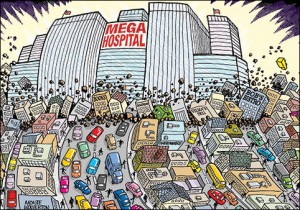As the General Assembly debates a rollback of the Certificate of Public Need (COPN) process, a new study has found that markets served by monopoly hospitals charge privately insured patients 15.3% more on average for a variety of routine procedures than hospitals do in competitive markets.
“Hospital market structure stands out as one of the most important factors associated with higher prices, even after controlling for costs and clinical quality,” write the authors of “The Price Ain’t Right? Hospital Prices and Health Spending on the Privately Insured,” published by the National Bureau of Economic Research.
The study is germane to Virginia’s COPN debate because state regulations impede the entry of new competitors in the medical marketplace. Most metropolitan markets in the state are monopolies or near-monopolies in which a single health care system own a dominant market share and enjoys pricing power in negotiations with private insurers.
If you want to know the premium that employers and patients pay in monopoly markets, 15% is a good rule of thumb. Employers/patients pay a roughly 7% premium in duopoly markets, and a 5% premium in triopoly markets. The price differential for Medicare is smaller because the federal government exercises monopolistic buying power (technically, that’s called a monopsony) and sets take-em-or-leave-em rates.
— JAB



